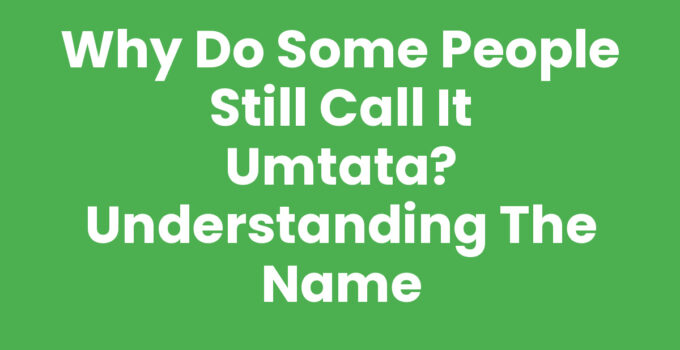Umtata, a town nestled in the Eastern Cape of South Africa, has been the subject of much discussion regarding its name. Despite the official name change to Mthatha in 2004, many people continue to refer to it as Umtata. This blog post delves into the reasons behind this phenomenon, exploring the history, cultural significance, and the ongoing debate surrounding the name.
Why Do Some People Still Call It Umtata: A Comprehensive Look
The name Umtata holds a deep-rooted significance for many South Africans, particularly those from the Eastern Cape. To understand why some individuals persist in using this name, we need to explore historical, cultural, and linguistic factors.
1. Historical Context:
Umtata was the name used during the apartheid era and the early years of democracy in South Africa. The name itself originates from the Xhosa language, where ‘Umtata’ translates to ‘the place of the river’. This historical connection resonates deeply within the local community.
2. Cultural Identity:
For many individuals, the name Umtata represents nostalgia and a sense of belonging. Changing a name does not erase the memories and experiences tied to it. Therefore, older generations, in particular, might continue to refer to the town as Umtata as a way of preserving their cultural identity.
3. Linguistic Habits:
Language habits are formed over years of usage. For individuals who grew up calling the town Umtata, reverting to the new name might seem unnatural. Language is often ingrained in personal identity, and many find it challenging to adapt to changes, especially when they carry emotional weight.
4. Resistance to Change:
There is a natural resistance to change within communities. Many residents associate the name Umtata with their childhood or significant life events. As such, some may feel that using Mthatha is an imposition of new narratives over their lived experiences.
Read Also: What Is The Matric Pass Rate In Mthatha: A Comprehensive Overview
The Importance of Names in Cultural Heritage
Names reflect cultural heritage and identity. The shift from Umtata to Mthatha represents broader socio-political changes in South Africa. Understanding the role of names can provide insight into how communities engage with their past and present.
1. Names as Cultural Anchors:
In many cultures, names carry significance that goes beyond mere identification. They often encapsulate history, tradition, and identity. The ongoing use of Umtata by some reflects their desire to hold onto their roots amidst the changes brought by globalization and modernization.
2. Reclaiming Indigenous Names:
The decision to officially change the name from Umtata to Mthatha was part of a larger movement to reclaim indigenous names. However, this action can often lead to division within communities. Some support the change as it honors African heritage, while others see it as a loss of their historical identity.
Further Reading: Health, Services & Government, Mthatha: A Comprehensive Guide
Moving Forward: Embracing Both Umtata and Mthatha
While the government and official entities may have transitioned to Mthatha, it’s essential to acknowledge the duality in naming. Embracing both Umtata and Mthatha can foster understanding and bridge divides. Communities can celebrate their history while also adapting to new realities.
1. Dialogue and Education:
Encouraging open dialogues about the significance of both names can foster communal understanding. Educational initiatives can help newer generations appreciate the historical importance of Umtata while also recognizing the present identity of Mthatha.
2. Community Engagement:
Local events can honor the town’s history and traditions while introducing the contemporary identity associated with Mthatha. This dual approach can help maintain ties with the past while progressing towards a unified future.
3. Preservation of History:
Documenting stories and histories associated with Umtata can preserve it in the cultural narrative. History isn’t only about names; it’s about stories, experiences, and collective memories that shape the community.
Recommended Reading: What Is The Average Salary In Mthatha: A Comprehensive Overview
Conclusion
Understanding why some people still call it Umtata is about more than just a name; it encompasses cultural identity, historical significance, and personal experiences. As South Africa evolves, finding a balance between honoring the past and embracing the future will be crucial for community cohesion.
Further Reading: What Is The “Wild Coast Meander”, Mthatha: A Complete Guide
Frequently Asked Questions
Why was the name changed from Umtata to Mthatha?
The name was changed as a part of efforts to reclaim indigenous names and reflect local heritage.
Is it wrong to still call it Umtata?
No, many people continue to use the name Umtata out of respect for their cultural history and personal experiences.
How can communities reconcile the two names?
By fostering dialogue, organizing community events, and documenting historical narratives, communities can embrace both Umtata and Mthatha.









